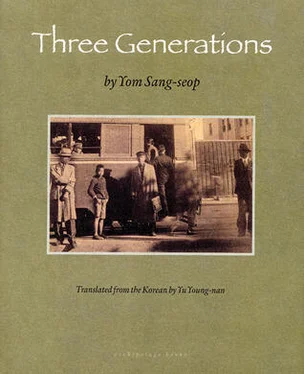An audible snort came from the main room. “Now I’ve heard everything! You were thrown in the slammer because I’m an awful wife. You don’t have the slightest that you’re out of prison thanks to your son. Without him, you’d still be locked up tight with all the other jailbirds — and I bet you’d have your new wife to thank for that!”
“Mother, please stop.” Deok-gi tried leading his father to the outer quarters. He asked his wife to bring out a wine tray right away, hoping to prevent a scene any way he could. He grieved for his father and did not want him to feel more humiliated than he already was.
“I’ll go. I just hope you’ll take good care of everything from now on!” His father rose despondently.
“It’s so cold. Please stay a moment more.”
Without another word, the father turned to leave.
“Go and call a rickshaw,” Deok-gi ordered a servant.
“I’ll just catch one on my way out.”
Deok-gi watched his father walk away, shoulders hunched, deflated.
The next day, a Sunday, Deok-gi called on Kimura to express his gratitude for releasing his father and to inquire about the release of the Suwon woman, Byeong-hwa, Gyeong-ae, and her mother. His exams were over and graduation was around the corner, but he thought he’d better wrap up affairs at home before leaving.
“That’ll be difficult,” Kimura explained when Byeong-hwa’s name was raised. “Hong Gyeong-ae and her mother can be released, but the situation has become worse for Byeong-hwa because of what happened to Jang Hun.” Then he added, “If it were proved that he has nothing to do with Jang Hun’s faction, he wouldn’t be prosecuted.”
Deok-gi insisted that Byeong-hwa had nothing to do with Jang Hun and explained that Pil-sun’s father, beaten by Jang Hun’s followers, was hovering between life and death at the hospital. He then went on to describe Byeong-hwa’s relationship with Pil-sun’s family. Kimura seemed to take what Deok-gi said seriously.
When the Suwon woman’s name came up, however, he was dismissive. “Her case is not in my jurisdiction, but from what I’ve heard, she’s trouble. When she first came to live at your house, she was part of a conspiracy with that Choe fellow.”
Kimura knew everything. Deok-gi was speechless. But out of respect for his grandfather, Deok-gi felt responsible for her, even if it might require some money to free her.
After he said good-bye to Kimura, Deok-gi went to Hyoja-dong to relay the good news and to see Pil-sun. Pil-sun greeted him near the shop. She appeared stronger, walking more steadily than she had a few days earlier, but was on the verge of tears.
“What’s wrong? Is your father worse?”
“They just called. He’s taken a turn for the worse.” Tears welled up in her eyes.
“Let’s go quickly.” Deok-gi led the way.
“Please don’t come with me. You must be busy. I’ll go by myself.”
They passed Chuseongmun on their way toward Samcheong-dong.
“My father spent half of his life in prison and then was nearly beaten to death. Why is life so unfair?” asked Pil-sun, crying, as they passed the spot where her father had been attacked.
Deok-gi paused before replying. Then, with regret in his voice, he said, “In a world like this, that was the only way for him to live with an uncorrupted spirit, with a clear conscience. Society is to blame for his grief, because it is without discipline or structure. It was an unfortunate, useless sacrifice that can’t be undone.”
When they arrived at the hospital, Deok-gi sensed that Pil-sun’s father had only hours to live. Judging from his experience with his grandfather’s death and by the way his eyes were glazed over, Deok-gi knew it wouldn’t be long. Still, the father was conscious and glad to see his daughter. He recognized Deok-gi as well.
“I’m going with a glad heart, but how will you survive?” he stammered with difficulty to his family, tears streaming down his face. His wife and daughter wept, too. Deok-gi’s heart ached to hear those words; this man has carried a heavy burden.
“Mr. Jo! I owe you so much. After I die, please be kind to them. I’m shameless to ask you this, but they have no one else to turn to.”
“You’re not dying, so please don’t say that. Don’t worry. Everything will be all right.” Deok-gi comforted the old man, because he couldn’t bring himself to say he’d take care of the man’s family.
What should I do about his request? It could’ve been just a passing request. People have to worry about making a living all their lives, and as if that were not enough, they have to keep worrying until their dying moments. Deok-gi left the hospital with a heavy heart.
He thought of Gyeong-ae’s father, though he had never met him. The old revolutionary must have asked the same favor of Deok-gi’s father that Pil-sun’s father had asked of him. Deok-gi remembered his mother’s remark about following in his father’s footsteps; her words haunted him.
After dinner, Won-sam trudged in while Deok-gi was reading the newspaper in the outer quarters. “I’ve come from the hospital.”
“Has he passed away?”
“Yes. He died in the evening, so we closed the shop and went to the hospital.”
“You could have phoned me. There was no need to come in person.”
“They’re having a funeral tomorrow, but they don’t want to invite you — they don’t want you to go out in the cold again. They said they’d be in touch after the funeral.”
“They shouldn’t do that. It would be different if I hadn’t been involved from the beginning.” Nevertheless, Deok-gi understood how they felt. He was grateful for their consideration, but he felt they were taking their solicitude too far by not notifying him right away.
“They seem to have few relatives, and it’ll be difficult to cover the funeral expenses. They’re going to use some money from the shop, but if you want to help, I thought I’d collect it for them. They don’t know that I’m here — I’ve come on my own. I realize it’s not my place to do this, but I had to do something.” Won-sam was afraid that the young master might find fault with his impertinence, though Deok-gi didn’t show any displeasure.
“You made the right decision. I’ll have to pay my respects anyway, so let’s go together.”
“There’s really no need for you to go. What if you get sick again, going out at night when you’re already so exhausted?”
“What time will they leave for the grave?”
“A time hasn’t been set yet, but it wouldn’t make any difference if you paid your condolences later. It’s as dark and chilly as a granary out there. Please just send them some money; that’s what is most urgent.”
Thinking he’d visit the next morning, Deok-gi wrapped up the money and took out some paper and candles left over from his grandfather’s funeral. After sending Won-sam away with the parcel, he had second thoughts and decided he couldn’t postpone his visit until the morning, especially when they’d grown so close. It was ridiculous to put off the visit because of the cold.
Because his mother believed that going out at night meant visiting women, Deok-gi always kept his coats in the outer quarters to avoid her nagging. Grabbing one as he left, he instinctively looked back.
A scolding seemed to be coming, not from his mother, but from the altar of his dead grandfather. You’re not studying. So what are you doing? He realized that since his grandfather’s funeral, he had become enmeshed in a three-ring circus. Even though he hadn’t graduated from college, he had assumed the responsibilities of three households. Was it too much to take care of Pil-sun and her mother as well? But wasn’t that what life was about?
Читать дальше












